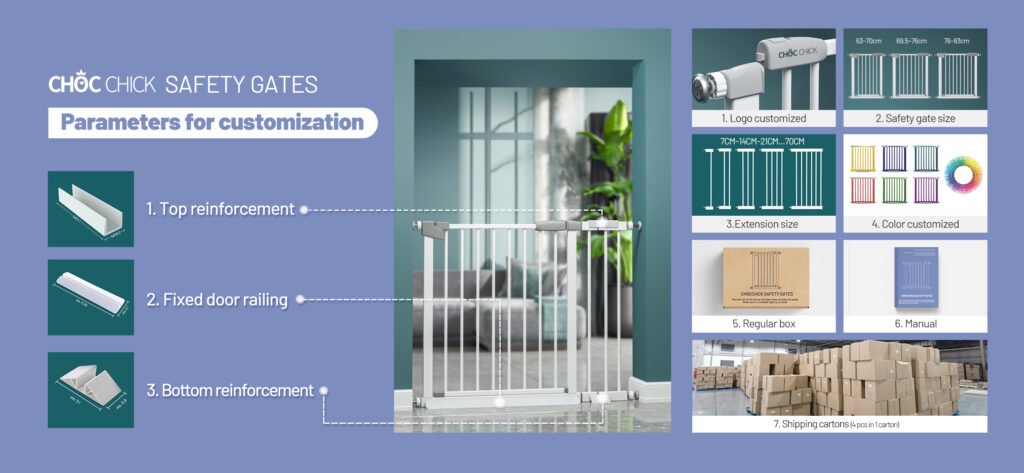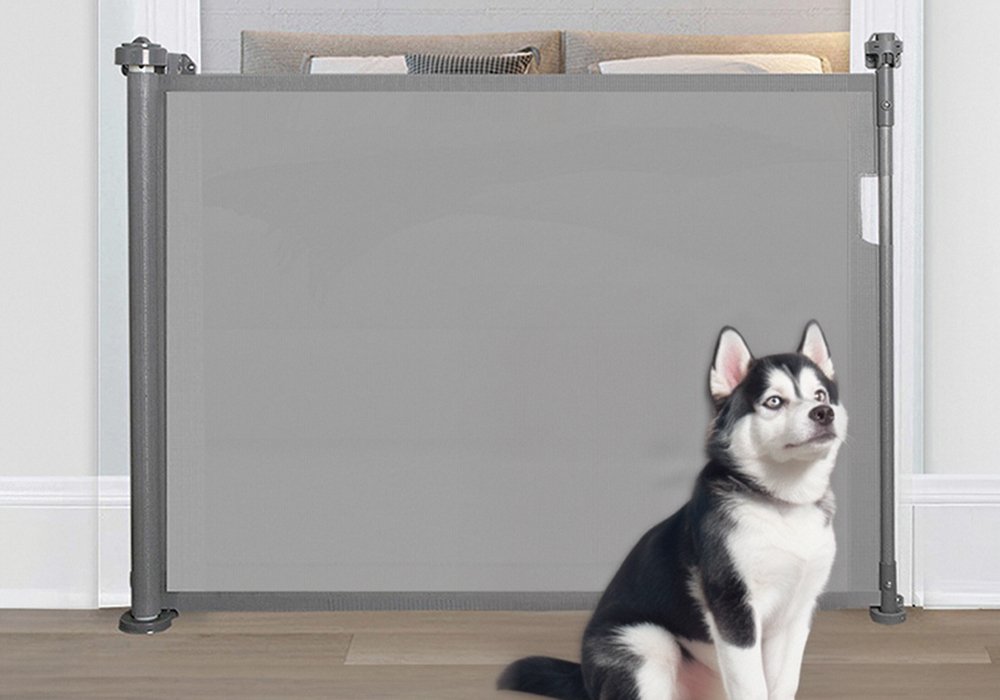Introduction
Let’s face it—once your baby starts crawling or toddling, everything becomes a potential hazard, especially those tempting stairs! That’s where a stairway retractable baby gate swoops in like a superhero. But choosing the right one? Now that’s the tricky part. No worries though—we’re diving deep into how to choose a stairway retractable baby gate that’ll keep your little one safe and your sanity intact.
Table of Contents
- Introduction
- Why a Retractable Baby Gate for Stairs?
- Key Features to Consider
- Types of Retractable Baby Gates
- Where Will You Install It?
- How to Measure Your Stairway Space
- Installation Tips for Maximum Safety
- Aesthetic and Style Considerations
- Budget vs. Quality
- Certifications and Safety Standards
- Maintenance and Cleaning Tips
- Top Mistakes to Avoid When Choosing
- Conclusion
- FAQs
- Share This Case:
Why a Retractable Baby Gate for Stairs?
Safety First, Always
Stair-related injuries are all too common in toddlers, and you can’t be everywhere at once. A retractable gate acts as a safety barrier, preventing adventurous climbers from taking a tumble.
Space-Saving and Flexible Design
Unlike traditional gates that swing open, retractable ones roll or slide away. This makes them perfect for tight or awkward spaces and even high-traffic stairways. Plus, they look cleaner and sleeker!
Key Features to Consider
Choosing the right gate isn’t just about “it fits” — it’s about performance, reliability, and convenience.
Gate Height and Width
Most retractable gates come in various heights (usually 30–40 inches). Taller is better if your child is a climber or if you have pets. Width matters too—measure your stair opening before you buy.
Material Durability
Mesh gates are popular for being lightweight and flexible, but not all mesh is created equal. Look for tear-resistant, UV-resistant materials. If you prefer something sturdier, opt for gates with metal reinforcements.
Locking Mechanism
A two-step locking system is ideal—it should be child-proof but easy for adults. Bonus points if it’s intuitive and can be operated without a manual every time!
One-Handed Operation
Parents rarely have two hands free. A gate that opens and closes with one hand? That’s gold.
Dual-Directional Opening
This feature allows the gate to open in both directions, which is handy for high-traffic areas. Just ensure it locks securely when retracted.

Types of Retractable Baby Gates
Wall-Mounted vs. Pressure-Mounted
- Wall-mounted gates: The safest option for stairways—especially the top. They screw directly into studs or solid surfaces.
- Pressure-mounted gates: Not ideal for stairs. They can shift or slip under pressure, especially on smooth floors.

Baby Gate for Stairs
Easy Install Pressure Mounted Pet Gates for Doorways, Baby Safety Gate for Stairs, Auto Close Dog Gate for the House
Features:
- Simplified lines for a sleek appearance
- Modern aesthetic with black and white color scheme
- Unique vinyl or paint finish for a contemporary look
- Arc-shaped bottom bar instead of standard 3cm tubes
- Reduces tripping hazards and accommodates robot vacuums
- Overall height is lower than the user for easy lock visibility
- Top-mounted switch for ergonomic locking
- Two-step lock mechanism: lift and unlock, childproof for safety
Mesh vs. Metal Retractable Gates
- Mesh: Flexible and minimalistic, but can sag over time.
- Metal: Stronger, often heavier, but gives you that extra peace of mind.

Retractable Baby Gate
Retractable Baby Gates for StairsDog Gate Indoor Extendable Child Gates for Doorways
Features:
- Adjustable Bracket for Avoiding Baseboard
- Expandable Size for Save Space
- Safety Double Lock Design
- Convenient One-handed Operation
- Universal Applicability
- Easy Installation
- Convenient One Handed Operation
Where Will You Install It?
Top of the Stairs
This location demands maximum safety. Use only wall-mounted retractable gates here—never pressure-mounted ones!
Bottom of the Stairs
While a bit more forgiving, wall-mounts are still your best bet.
Banister-to-Wall Installations
If you have a banister, you might need additional hardware like mounting kits, clamps, or adapters.
Wall-to-Wall Installations
This is the easiest and safest setup. Just make sure you anchor into studs for a secure hold.
How to Measure Your Stairway Space
Width and Height Requirements
Measure both the width at the base and top of the stairs. Stairways aren’t always symmetrical. Also, check for height clearance if your gate extends upward.
Odd-Angle or Uneven Surfaces
Got baseboards or angled banisters? You might need spacers or custom brackets. Don’t try to force a bad fit—it’ll just compromise safety.
Installation Tips for Maximum Safety
Follow Manufacturer Guidelines
Read the instructions! Every gate installs a little differently, and skipping a step could put your child at risk.
Anchor into Studs or Use Adapters
For stair use, always anchor to a stud or solid wood. If that’s not possible, use official adapter kits—not duct tape or DIY hacks.
Aesthetic and Style Considerations
Matching Interior Design
You’ll be looking at this gate every day, so choose one that matches your vibe—neutral tones, wood finishes, or minimalist metal.
Visibility and Discreet Storage
When not in use, does it vanish out of sight or stick out like a sore thumb? Retractable gates win in the sleek storage department.
Budget vs. Quality
Avoiding Cheap Plastic Models
If it looks flimsy, it probably is. Low-cost gates often use sub-par materials that won’t last.
Long-Term Value and Brand Reputation
Sometimes spending a bit more saves money in the long run. Stick with reputable brands known for safety and durability—read reviews and ask other parents.
Certifications and Safety Standards
ASTM, JPMA, and EN Standards
Look for labels that certify safety compliance. ASTM and JPMA (in the U.S.) or EN 1930 (in Europe) are gold standards.
Look for Recalls and Reviews
Always check for product recalls. And real parent reviews? They’re worth their weight in gold.
Maintenance and Cleaning Tips
- Wipe down mesh or metal regularly with a damp cloth.
- Check for loose screws or wear-and-tear every month.
- If your gate gets squeaky, a drop of baby-safe lubricant can do the trick.
Top Mistakes to Avoid When Choosing
- Choosing a pressure-mount gate for stair tops
- Forgetting to measure properly
- Ignoring your stair’s specific shape or layout
- Skipping wall anchors
- Falling for style over substance
Conclusion
Choosing a stairway retractable baby gate is a serious decision—but it doesn’t have to be overwhelming. Think safety first, measure your space carefully, and pick a model that fits both your needs and your home’s style. When done right, the right baby gate becomes an invisible hero—quietly keeping your child safe every single day.
FAQs
Q1: Can I use a pressure-mounted gate at the top of the stairs?
Nope! That’s a big no-no. Pressure-mounted gates can shift and pose a huge fall risk. Stick with wall-mounted ones for stair tops.
Q2: Are retractable gates strong enough for toddlers?
Yes, if you choose a quality gate with strong materials and secure locking. Mesh gates may flex, but they hold up when properly installed.
Q3: What’s the average lifespan of a retractable baby gate?
Typically 2–5 years, depending on usage and material. Higher-end gates tend to last longer.
Q4: Can I install a gate without drilling holes?
Not safely for stairways. For serious childproofing, drilled-in wall mounts are your safest bet.
Q5: Are retractable baby gates pet-friendly too?
Absolutely! They work great for keeping pets off stairs or out of certain rooms—just make sure they’re tall enough if your pet’s a jumper.




ug7771 https://www.ug7771.org